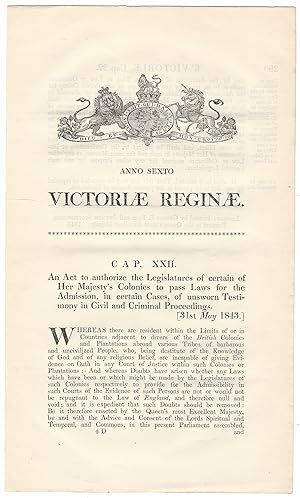About this Item
Folio (11.75). 6 Victoria, Chapter 22. Caption title, pages 289-290 + conjugate blank. Engraved Royal coat of arms. Neatly extracted from a bound volume and expertly mended. This Act, relating to unsworn testimony provided by First Nations witnesses in courts of law, remains one of the most important and most neglected pieces of legislation on British colonial Aboriginal issues. It noted the injustices caused by the inadmissibility of First Nations evidence in British colonies, and called for the discrimination to be overturned to permit unsworn testimony in colonial courts. The Act reads: Whereas there are resident within the Limits of … British Colonies and Plantations abroad various Tribes of Barbarous and uncivilized People, who, being destitute of the Knowledge of God and of any religious Belief, are incapable of giving Evidence on Oath in any Court of Justice within such Colonies or Plantations: And whereas Doubts have arisen whether any Laws … made by the Legislatures of such Colonies respectively to provide for the Admissibility in such Courts of Evidence of such Persons … would not be repugnant to the Law of England … and it is expedient that such Doubts should be removed (from page 289 of the Act). Common law ruled that evidence could only be given under oath, which rendered those devoid of religious belief incompetent to testify. The Act allowed colonial Legislatures to pass Acts or Ordinances to allow Indigenous inhabitants within their jurisdiction to give testimony before a court of justice without swearing an oath. The Act also confirmed that any laws made by Legislatures of British colonies, that provided for the admission of unsworn evidence of certain specified persons residing therein, would have the same effect as other colonial laws. The Act was originally prepared in response to issues met with in the colonies of South Australia and New Zealand, but applied to all British colonies, including Canada. By the mid-1860s, unsworn testimony emerged as a significant issue on Vancouver Island. The Act gave the authority to Governor Frederick Seymour and the Legislative Council of the Colony of British Columbia to address the issue of unsworn testimony and allow for: any Court, Judge, Coroner, Gold or other Commissioner, or Justice of the Peace … to receive the evidence of any Aboriginal Native, or Native of the half-blood, of the Continent of North America, or the Islands adjacent thereto, being an uncivilized person, destitute of the knowledge of God … without administering the usual form of oath … but upon his affirmation or declaration to tell the truth, the whole truth, and nothing but the truth. The acceptance of unsworn testimony was the first attempt to bring aspects of Aboriginal law into the sphere of customary law and into the greater realm of British common law. Seller Inventory # 178
Contact seller
Report this item
![]()
